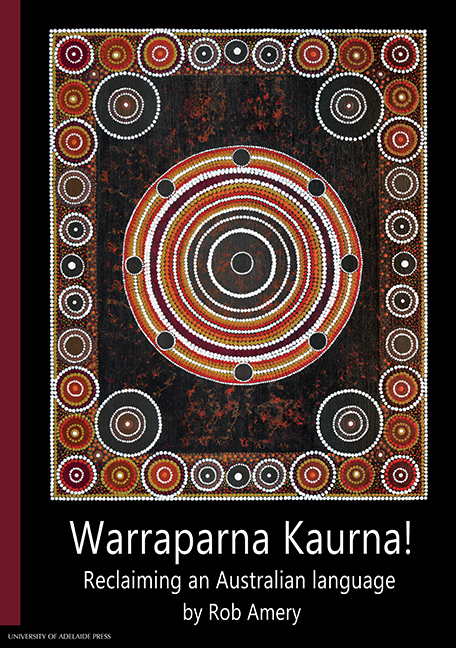Book contents
- Frontmatter
- Contents
- Maps, Plates, Graphs and Tables
- Preface to this Edition (2016)
- Foreword to the 2000 Edition
- Preface to the 2000 Edition
- Acknowledgements
- Abbreviations
- Conventions and Terminology
- Chapter 1 Locating the Study
- Chapter 2 Language Reclamation
- Chapter 3 An Ecological Approach to Language Revival
- Chapter 4 A Sociolinguistic History of Kaurna
- Chapter 5 Kaurna Sources
- Chapter 6 Restoring and Transforming the Kaurna Language
- Chapter 7 Kaurna Language Programs
- Chapter 8 Kaurna in Society
- Chapter 9 Kaurna Language Revival: The Formulaic Method
- Chapter 10 Sociopolitical Dimensions of Kaurna Language Revival
- Chapter 11 Into the Twenty-first Century: Developments since 2000
- Chapter 12 Summary and Conclusions
- Bibliography
- Index
Preface to the 2000 Edition
Published online by Cambridge University Press: 28 July 2017
- Frontmatter
- Contents
- Maps, Plates, Graphs and Tables
- Preface to this Edition (2016)
- Foreword to the 2000 Edition
- Preface to the 2000 Edition
- Acknowledgements
- Abbreviations
- Conventions and Terminology
- Chapter 1 Locating the Study
- Chapter 2 Language Reclamation
- Chapter 3 An Ecological Approach to Language Revival
- Chapter 4 A Sociolinguistic History of Kaurna
- Chapter 5 Kaurna Sources
- Chapter 6 Restoring and Transforming the Kaurna Language
- Chapter 7 Kaurna Language Programs
- Chapter 8 Kaurna in Society
- Chapter 9 Kaurna Language Revival: The Formulaic Method
- Chapter 10 Sociopolitical Dimensions of Kaurna Language Revival
- Chapter 11 Into the Twenty-first Century: Developments since 2000
- Chapter 12 Summary and Conclusions
- Bibliography
- Index
Summary
This book is the chronicle of the early stages of the revival of a language that ceased to be spoken many years ago. This revival is based on historical documents, most of which were recorded in the period 1836-1858. Taking an ecological perspective, I trace the history of the language and all known sources.
However, as this book goes to press, an additional early German source has just come to light. Dr Hermann Koeler visited South Australia in 1837 and 1838 and published a list of approximately 150 words and eight Pidgin Kaurna sentences, together with observations on the customs of the Kaurna people and the state of the colony, which await translation. This source is a significant find, with the potential for adding several words to the known lexicon and helping to refine our knowledge of the meanings and pronunciation of some words. The Pidgin Kaurna sentences appear to correlate closely with sentences recorded by Williams and Wyatt (analysed by Simpson, 1996), providing further confirmation of the existence of a Pidgin Kaurna language. It is possible that further research in the German archives will unearth additional documents in the future.
My analysis of Kaurna language revival focuses primarily on the period 1990-1997. Kaurna language revival began with the writing of six songs in 1990. Since then, the language has developed considerably; Kaurna programs have been established and expanded across several institutions catering for a range of learners; increasingly, the language is being used in public by members of the Kaurna community; the range of functions for which the language is being used continues to expand; and there are early signs that the language is beginning to take root within Nunga households.
The study is part of a long-term ongoing project, where the ground is continually shifting. The use of and interest in the Kaurna language is gathering momentum and much has happened since 1997. Kaurna language reclamation is an exciting collaboration between Kaurna people, educators, linguists and others.
However, we are still in the very early stages of Kaurna language revival. Will the Kaurna language take the ‘great leap forward’ and emerge as an everyday language within the Kaurna community? Experience elsewhere tells us that the prospects for this to happen are slender. However, the programs have already been a success in the eyes of the Kaurna community and within the education sector.
- Type
- Chapter
- Information
- Warraparna Kaurna!Reclaiming an Australian language, pp. xxiiPublisher: The University of Adelaide PressPrint publication year: 2016



